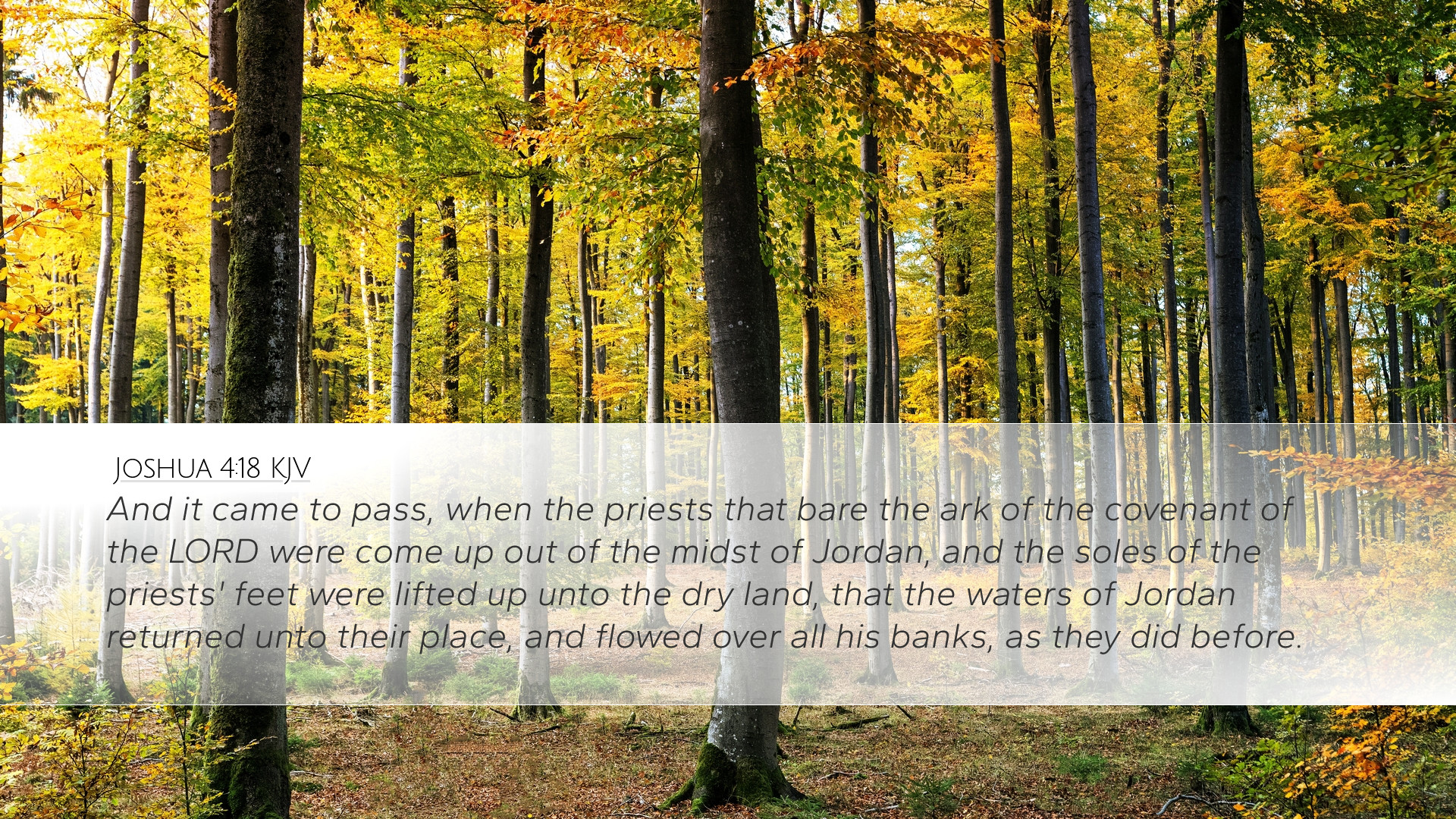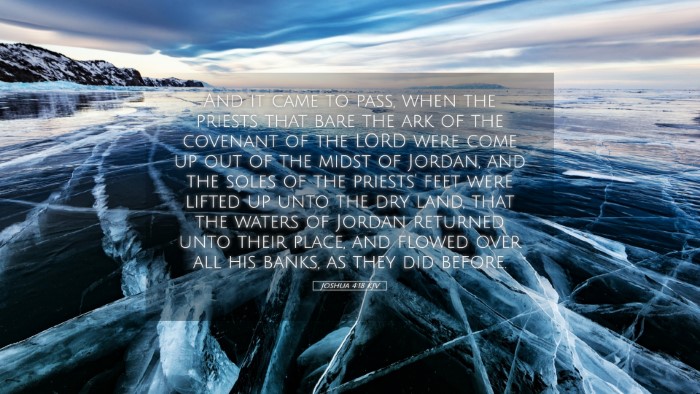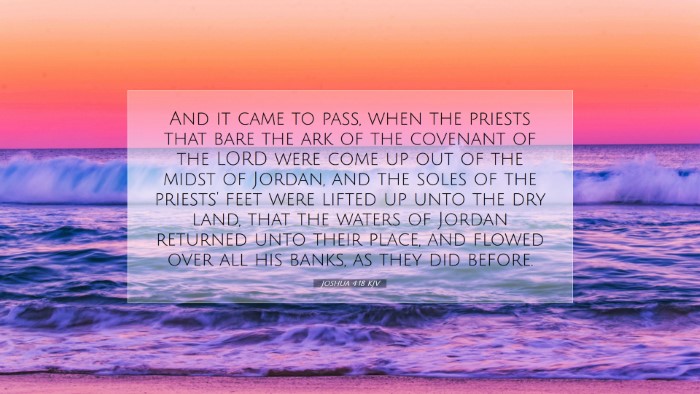Old Testament
Genesis Exodus Leviticus Numbers Deuteronomy Joshua Judges Ruth 1 Samuel 2 Samuel 1 Kings 2 Kings 1 Chronicles 2 Chronicles Ezra Nehemiah Esther Job Psalms Proverbs Ecclesiastes Song of Solomon Isaiah Jeremiah Lamentations Ezekiel Daniel Hosea Joel Amos Obadiah Jonah Micah Nahum Habakkuk Zephaniah Haggai Zechariah MalachiJoshua 4:18
Joshua 4:18 KJV
And it came to pass, when the priests that bare the ark of the covenant of the LORD were come up out of the midst of Jordan, and the soles of the priests' feet were lifted up unto the dry land, that the waters of Jordan returned unto their place, and flowed over all his banks, as they did before.
Joshua 4:18 Bible Commentary
Commentary on Joshua 4:18
Verse Context: Joshua 4:18 states, "And it came to pass, when the priests that bare the ark of the covenant of the LORD were come up out of the midst of Jordan, and the soles of the priests' feet were lifted up unto the dry land, that the waters of Jordan returned unto their place, and flowed over all his banks, as they did before." This verse marks a significant moment in Israel's journey, indicating the transition from the wilderness to the Promised Land.
Historical Context
The crossing of the Jordan River was pivotal in the Israelites' journey. It represented the fulfillment of God's promise to bring His people into a land flowing with milk and honey. The miraculous crossing under Joshua's leadership exemplifies divine intervention and reaffirms God's faithfulness to His covenant with Israel.
Commentary Insights
Albert Barnes
Barnes emphasizes the miraculous nature of this event. He notes that the priests, bearing the Ark of the Covenant, stood in the midst of the Jordan while the waters were held back, demonstrating God's sovereignty over nature. As soon as the priests lifted their feet onto dry land, the waters returned, signaling the end of that miraculous event.
Matthew Henry
Henry provides a reflective viewpoint on the significance of the priests’ actions. He states that the priests' role was not merely to carry the Ark, but to act as a pivotal link between God and the people. By standing firm in the river, they showed faith in God’s power, which was crucial for the Israelite community. Henry highlights that the returning of the waters signifies God’s timing and control over His creation.
Adam Clarke
Clarke focuses on the implications of the priests being the first to step onto dry land, suggesting that this act signifies leadership and responsibility. He argues that the priests exemplified obedience and faith which were necessary for the community’s sake. Their immediate departure from the riverbed also highlights the urgency of moving into the Promised Land, instilling in the Israelites a sense of trust in God’s guidance.
Theological Themes
Faith and Obedience
This scripture encapsulates the themes of faith and obedience. The priests had to step into the water first, showcasing that sometimes faith requires taking the initial step before seeing God’s provision. The act of obedience is a recurring motif in scripture and is essential for fulfilling God’s plans.
God's Sovereignty
The return of the Jordan’s waters points to God’s sovereignty over the natural world. It serves as a reminder of His omnipotence and authority. The swift return of the waters after the priests had completed their role demonstrates that God’s plans will not be thwarted, and His purposes shall prevail.
Symbolism of the Ark
The Ark of the Covenant symbolizes God's presence among His people. Its centrality in this event underscores the importance of recognizing and revering God's presence as the people transition into a new phase of their journey. This portable focus of divine communion highlights the notion that God accompanies His people in every circumstance.
Practical Application
For pastors and theologians, Joshua 4:18 serves as a rich text for exploring themes of leadership, faith, and divine presence.
Call to Leadership
Pastors may draw parallels between the priests' role and their own call to lead congregations. Just as the priests stepped forward in faith, spiritual leaders are often called to act decisively, trusting in God’s guidance for their communities.
Encouragement in Faith
This account encourages believers to take bold steps of faith, trusting that God will fulfill His promises. The miraculous crossing serves as an illustration for Christians to hold fast to God’s faithfulness, especially in moments of uncertainty.
Recognizing God's Presence
Finally, this passage invites reflection on how congregations can become more aware of God's ongoing presence in their lives. By recognizing that God is actively leading, believers can gain the confidence to move forward in their individual and collective journeys.
Conclusion
Joshua 4:18 is not merely a historical account but a profound theological statement about faith, obedience, and God’s constant presence. The insights from respected commentators encourage deeper understanding and application of this scripture in the lives of believers today.


